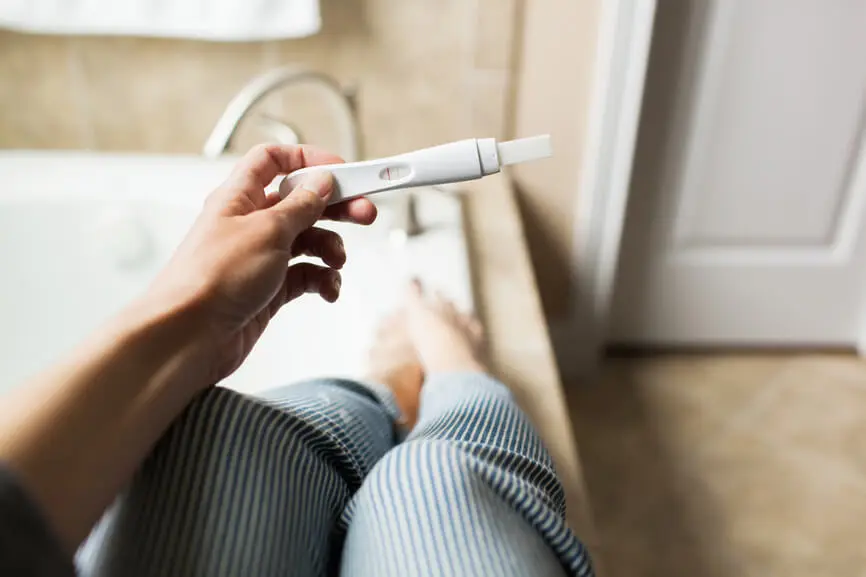What causes irregular periods?
Contents
Periods are considered irregular when they do not come in the normal range, mean -periods that occur less than 21 days or more than 35 days.
If your periods stay more than 7 days or bleeding last only 1 to 2 days just spotting like, so is also considered irregular periods.
Irregularity in your periods can happen due to any reason including:
- PCOD (polycystic ovarian syndrome)
- Stress
- Hormonal disturbances like thyroid disfunction
- Overweight or underweight
- low hemoglobin
- missed or irregular periods can also be due to pregnancy
- travel
- excessive exercise
- Dysfunctional uterine bleeding (DUB)
- missing doses of birth control pills
Check Out – What Causes of Irregular periods After Child Birth?

Is it Pregnancy or an Irregular period?
Irregular periods can mean either the early onset of periods or the late onset of periods.
People who have delayed periods think of certain things like becoming pregnant without diagnosis or realizing it.
If you are pregnant (early pregnancy) some of the common things grossly noticed that you notice, include:
- Vomiting
- nausea
- feeling of tiredness
- giddiness
- feel lazy
- sometimes you feel very drowsy, very sleepy
- changes in the way you eat like some eating too much, or often they feel like eating
All these are indirect ways of feeling that you are pregnant.
NOTE: Spotting is common in early pregnancy, and light bleeding does not mean that a woman is getting their periods.
But researchers say these are not diagnostic points because sometimes they can be falsely present.
The only way to ensure is to take a pregnancy test or diagnosis with a doctor, which performs some tests including:
- Urine test
- blood test (which is the serum beta Hcg test)
Check Out – Mistakes That Pregnant Women Should Avoid
Can women get pregnant with irregular periods?
Yes, irregular menstrual cycles don’t always affect fertility, even many women with irregular menstrual cycles get pregnant. but how?
Getting pregnant is related to ovulation (a process of release of an egg from the ovaries), meaning – women are most likely to get pregnant in this stage.
In Irregular periods women usually still ovulate, but just not on a regular. Kidhealth.org says.
So it makes it difficult for women whether she is pregnant or not because they do not know when the period will be? and also makes it hard for a girl to know when she is most fertile.
NOTE: Irregular periods, your chances for pregnancy may be more limited than a woman with regular periods.
It is also vital for women to know whether the irregular periods are just due to a physiological condition or a medical condition.
As long as we know it is a physiological condition, you need not worry that it can lead to pregnancy difficulty. there are many causes of this condition are:
But there are certain pathological or medical conditions such as:
- Tumors in the brain, or an abnormality in the uterus
- uterus tuberculosis
- ovarian
So talk to your doctor about irregular periods and not getting pregnant, they will diagnose to find out what is the real cause?
Check Out – Irregular Periods in Teenage Years
Tips to get pregnant during irregular periods?
Many studies say that having to do unprotected intercourse at least every 2 to 3 days to get pregnant.
Also, some women with irregular periods take fertility treatment, and some changes in lifestyle can help them to conceive.
Don’t try any personal method to get pregnant if you really don’t know about it, so, talk to your doctor, they may recommend you:
- The doctor may suggest an ovulating kit.
- may Prescribe Clomid for stimulating ovulation, which can be effective in women with PCOS.
- If you are overweight then weight loss also helps regulate ovulation as same as underweight women.
- If irregular periods are caused by thyroid issues and other health issues, so consult your doctor.
Whatever reason for not getting pregnant whether it is irregular periods blocked fallopian tubes, infertility, etc consult your doctor first.
Best time to get pregnant in irregular periods
Planning a pregnancy, especially in the irregular cycle is a big challenge for the couple there are certain methods that can be followed like:
- Basal body temperature which should be taken from day one of the cycles it should be taken before the lady gets out of the bed and this should be monitored throughout the cycle.
- Rising temperature before intercourse is a good time to conceive.
- The second thing you noticed was the vaginal discharge during ovulation which is a very thin discharge with and fishy odor or egg.
Now tests like ovulation one are the kit (this precedes 24 to 48 hours before the time of ovulation so this will give you a clue).
Follicular test where shows how follicles develop, and what is the growth or when they are ovulating.
With all these test detections this is how a lady can find out which is the best time to conceive with irregular cycles.
NOTE: If you don’t want to get pregnant but don’t compromise with sex so may take this precaution:
- Use a condom, every time to protect against unplanned pregnancy
- birth control pills
- the contraceptive pill can be used to prevent pregnancy after sex if birth control was not used
BOTTOM LINE
Periods are considered irregular when they do not come in the normal range, mean -periods that occur less than 21 days or more than 35 days.
Obesity is one of the common reasons, that affects children negatively.
Yes, women with irregular periods can get pregnant, but chances for pregnancy may be more limited than a woman with regular periods.




